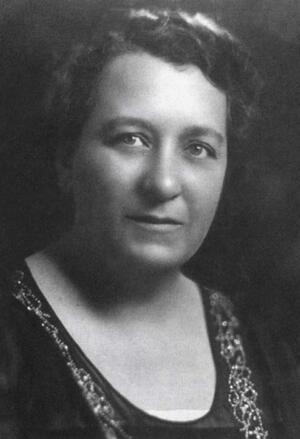Political trailblazer Belle Moskowitz wins passage of bill regulating NY dance halls
Born in New York City on October 5, 1877, Belle Moskowitz initially studied drama, hoping for a career on the stage. Dissuaded by her parents' objections, she went instead to work for the Educational Alliance, a Jewish settlement house, where beginning in 1900 she managed the roof garden, exhibits, and musical and dramatic entertainment. Though she resigned from the settlement at the time of her 1903 marriage, she maintained an active schedule of volunteer work with the United Hebrew Charities, the New York State Conference of Charities and Corrections, and the National Council of Jewish Women (NCJW). Particularly influential was her work with the NCJW to force the state to regulate dance halls, which were seen as unsavory places of unhealthy amusement for working girls. A bill to force dance halls to obtain state licenses passed the New York Assembly on May 26, 1910, having passed the Senate a few weeks earlier. Governor Charles Hughes signed it into law the next day. It was Moskowitz's first foray into state politics, a realm in which she would become a figure of foremost significance.
After her first husband died in 1911, Moskowitz worked briefly for the Metropolitan Life Insurance Company and then for several years as a grievance clerk for the Dress and Waist Manufacturers Association, mediating between workers and the Association. In addition, she continued her volunteer work, serving on committees to rid New York of brothels and investigating gambling and police graft. In 1914, she married Henry Moskowitz, who was also involved in Progressive reform. In 1918, the Moskowitzes chose to support Al Smith for governor of New York, despite his links to the Democratic political machine. It was an unusual choice for staunch Progressives, but one that would shape the rest of Belle Moskowitz's life.
Moskowitz's first work for Smith was to organize women, who were enfranchised in New York in 1917, to support his campaign. This work brought her to Smith's attention, and when he won the election, she became one of his close advisors. Smith lost his post in 1920, but won reelection in 1922. Though he offered Moskowitz a government post, she chose instead to become the publicity director for the State Democratic Committee. In that role, she edited Smith's public papers, wrote his speeches, prepared legislation, and worked with the press, becoming one of the most influential figures in the state party.
When the Democratic National Committee convened on June 26, 1928, Belle Moskowitz was the only woman on that body. Though not physically present at the meeting, she was as influential as any man there. The networks she had created in New York helped to secure the Presidential nomination for Al Smith, the first major Catholic candidate for US President. After his nomination, she directed national campaign publicity. When Smith lost to Herbert Hoover, Moskowitz stayed on as his press agent, and coordinated his campaign for the 1932 nomination, which Smith lost to Franklin Roosevelt.
Shortly after Roosevelt won the Presidency, Moskowitz fell down her front steps and broke both arms. In January 1933, at age 55, she died of a blood clot related to the injury. The New York Times reported that some 3,000 people attended her funeral. Smith, who called her death "a disaster," said that his longtime advisor "had the greatest brain of anybody I ever knew." His words were a tribute to a woman who, although she never served in an elected position, was undoubtedly the most influential female political activist of her day.
Sources: Jewish Women in America: An Historical Encyclopedia, pp. 943-945; New York Times, May 27, 1910, January 3, 1933, January 5, 1933; Elisabeth Israels, Belle Moskowitz: Feminine Politics and the Exercise of Power in the Age of Alfred E. Smith (New York, 1987, 1992).



